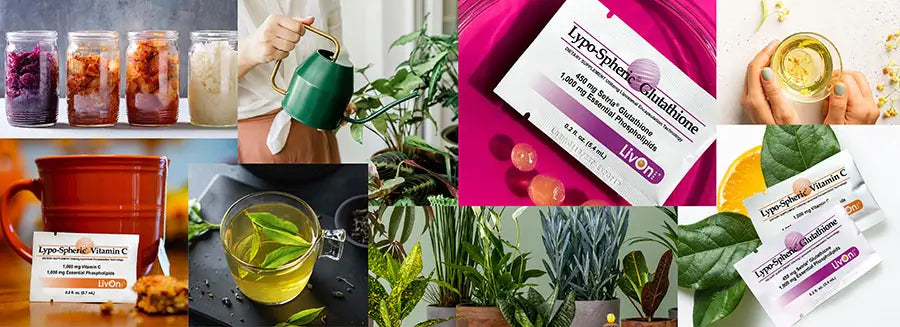
by Mia Rigden, board-certified nutritionist, classically trained chef
Good news! If you’re eating for brain, bone, heart, muscle, and liver health, you’re already supporting healthy skin with nutrition. Better news: These five lesser-known targeted nutrition hacks can take your skin regimen up a notch.
Best news? A top-line understanding of how free radicals and antioxidants affect skin health explains the “why” behind these hacks and can help you adhere to them. Free radicals are unstable molecules that damage skin cells (really all cells, but we’re talking about skin here) and can lead to premature aging, inflammation, and more. Excess free radicals result from smoking, alcohol, lack of sleep, excess sun exposure, toxins, and other irritants. Antioxidants are the antidote. Binding to free radicals, antioxidants stabilize them to prevent cellular damage.
Now that we have that covered, try these five nutrition hacks to preserve the health and appearance of your skin.
1. Take vitamin C and collagen supplements daily.
Collagen is the most abundant protein in the body, but production declines as we age, causing dryness and wrinkling of the skin. Vitamin C works synergistically with collagen in a few ways. First, it helps your body absorb collagen, which is why I take mine alongside alongside my collagen supplement.
A potent antioxidant, Vitamin C protects collagen from damage by free radicals while also supporting our own natural production of collagen. Collagen powder is heat stable, so I love adding to my morning coffee after a shot of Lypo-Spheric® Vitamin C.
2. Consume at least one fermented food per day.
Fermented foods like yogurt, cottage cheese, kimchi, sauerkraut, and miso offer many benefits for the skin. They contain probiotics, which are beneficial bacteria that can help keep your skin clear and prevent rashes. Their rich vitamin, mineral, and antioxidant content supports anti-aging efforts while their lactic acid helps keep your skin moisturized (it’s also a popular ingredient in skincare products). Fermented foods promote healthy digestion, and we all know gut health can show on the face!
3. Eat at least 30 different plants per week.
Plants — including fruits, vegetables, nuts, seeds, and legumes — are excellent sources of fiber and micronutrients (vitamins, minerals, antioxidants, and phytonutrients). Consuming adequate fiber is important for healthy digestion, which can reduce breakouts, redness, and skin sensitivity. And the greater diversity of plants in our diet, the more micronutrients we consume; my recommendation is 30 different plants per week.
That might sound like a daunting number, but it’s easier than it seems. Remember, garlic, onion, herbs, different types of lettuces, berries, beans, nuts, and seeds all count as distinct plants. Adding variety to your diet is a great way to introduce more flavor and excitement, and the array of nutrients you’ll consume will help support skin cell growth and repair, produce oil, reduce inflammation, and a lot more.
4. Drink green tea.
Among green tea’s beneficial skin health nutrients are antioxidants and vitamin B2 to help fight fine lines and wrinkles, Vitamin E for moisture and skin repair, caffeine to help fight free radicals, and polyphenols to protect from UV damage. Just five cups of green tea a week can reveal these benefits. A good quality matcha can do the trick!
5. Get your anti-AGE’ing nutrients.
Advanced Glycation End products (AGEs) build up in your skin, damaging collagen and causing wrinkles. As AGEs are waste products of sugar metabolism, the key is to consume the nutrients that block them. The vitamins B1, B3, and B6 fight AGE formation, as does universal antioxidant Alpha Lipoic Acid. I always aim to consume these B vitamins in foods like whole grains, fish, poultry, and legumes, but Lypo-Spheric® B Complex Plus is excellent insurance for potential dietary gaps.
Alpha Lipoic Acid is tricky because it’s not found in many foods and pill supplements are hard to absorb, so I recommend Lypo-Spheric® R-Alpha Lipoic Acid to my clients concerned about blood sugar health.
How to use nutrition for skin health
Before you implement these five hacks, make sure you’ve got the basics down. Drink plenty of water, get your beauty sleep, eat nutrient-dense foods, and avoid excessive alcohol, sugar, and smoking. This is your foundation, your North Star, not just for your skin but for overall health. When you can check these off the daily list, these five nutrition hacks can be just what your skin needs to defy the realities of time as much as naturally possible.
Mia Rigden is a Los Angeles-based board certified nutritionist, trained chef, and the author of The Well Journal (2020) and Foodwise (2023), a comprehensive, encouraging guide to healthy eating with 100 original, nutritionally-balanced and flavor-enriching recipes. Learn more about working with Mia on her website, check out an online course, and follow on Instagram @mia_rigden for science-backed, practical nutrition advice.

